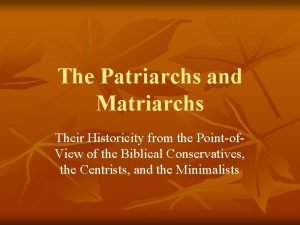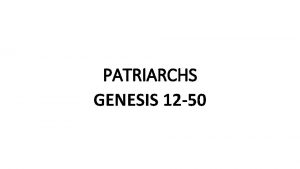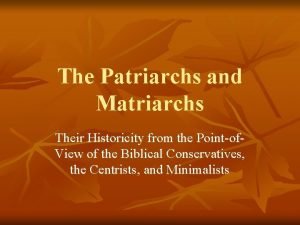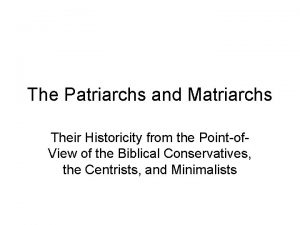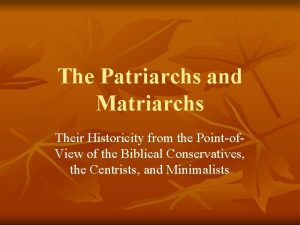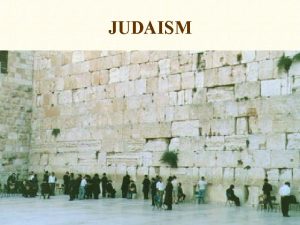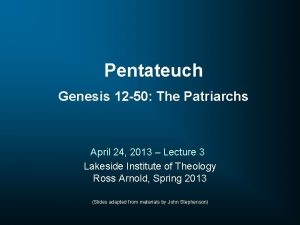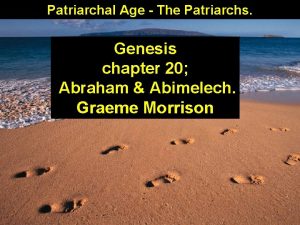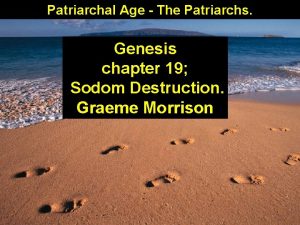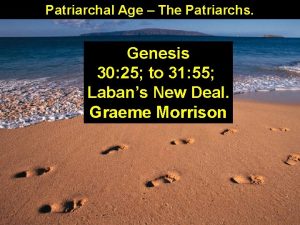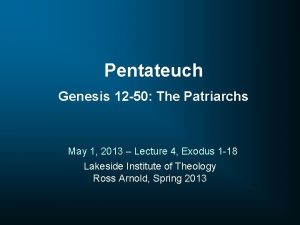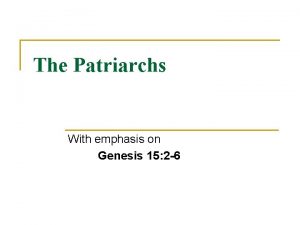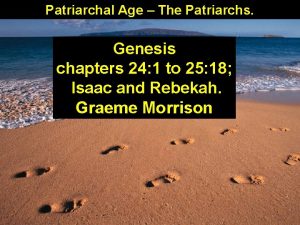PATRIARCHS GENESIS 12 50 THE HISTORICITY OF THE















- Slides: 15

PATRIARCHS GENESIS 12 -50

THE HISTORICITY OF THE PATRIARCHS THEORIES (A)Judeo-Christian view • They were historical • The stories include both authentic and unauthentic material that has been reshaped.

EVIDENCE FOR 1. Death bed blessings were common and acceptable in Nuzi. (Gen 27: 2) 2. Esau’s sale of his birth right (Gen 25: 31 -33) is paralleled in Nuzi contract. 3. The protected position of a slave who bears her master a son in place of a barren wife (Gen 16, 30: 3) is known at Nuzi in the code of Hammurabi. 4. The general life of the Patriarchs suit the life style described in the Nuzi documents. E. g. farming, trade. 5. The bible says so.

(B) THEY WERE NOT HISTORICAL • The stories are viewed as Sagas, acted out, by individual characteristics. • The stories are retrojection into antiquity by writers in the postexilic period.

ARGUMENTS FOR 1. Archeologically nothing was found that link directly to the patriarchs. 2. The city of Ur could have been legendary. 3. Numerical schematic pattern. E. g. ages • For 4, 5 and 6 to go theories.

1. ABRAHAM • Themes- basically two themes. (a) God makes a promise to Abraham. (b) God blesses Abraham and makes him his special, chosen friend, because Abraham is faithful.

PROMISE (GEN 12: 2 -3) • I will make you a great nation. • I will bless you. • I will make your name great. • I will curse those who curse you. • All the people of the world shall bless themselves in you. • I will give the land to your descendants. • I will give you many off springs. • I will make you a powerful nation.

ND 2 THEME: FAITHFULNESS • He worshiped Yahweh at Bethel, Hebron, and Jerusalem. • Always on a journey as Yahweh commands. • Sacrificing Isaac.

2. ISSAC • Not much is said about him. • His marriage to Rebecca. (Gen • The birth of their sons Esau and Jacob. • His blessings to Jacob.

3. JACOB • Three groups of stories 1. Jacob and Esau stories (Israel and Edom) (Gen 25: 23) 2. Sagas around Jacob’s marriages and his adventures with Laban. The stories are eponymous. 3. The theophanies at Bethel, Mahanaim, Penuel.

SAGAS • These are heroic stories about the ancestors of a well-known family. • Have colorful features. • Portray heroes as fearless and as bigger than real life itself. • Sometimes are very long and poetic. • They have many versions.

THE JOSEPH STORY • Is placed there to give the platform for the going to Egypt and the beginning of the Salvation history.

THE GOD OF OUR FATHERS • First made known to Moses. (Ex 3: 6) • Each tribe worshipped God under a different name. • But now accepted a single God and a single national Identity, Israel. • God of our Fathers was meant to include everyone. • It took time for people to embrace or understand the unity starting from Moses to the Judges.

OTHER NAMES OF GOD • Fear of Isaac (Gen 31: 53) • Bull of Jacob (49: 24) • God Most High (Gen 14: 19 -20) • El Shaddai- God the Almighty (Gen 49: 25)

QUESTIONS Were they monotheistic? (A) 1. Different Gods worshipped at different shrines. 2. Moses united tem under Yahweh. (B) 1. They had different notions of the same God. 2. They might have different notions of God, but Moses united them under Yahweh as one nation using religion and Common identity.
 Patriarchs and matriarchs
Patriarchs and matriarchs What is the meaning of the patriarchs for our faith today
What is the meaning of the patriarchs for our faith today Phối cảnh
Phối cảnh điện thế nghỉ
điện thế nghỉ Một số thể thơ truyền thống
Một số thể thơ truyền thống Thế nào là hệ số cao nhất
Thế nào là hệ số cao nhất Hệ hô hấp
Hệ hô hấp Số nguyên tố là
Số nguyên tố là đặc điểm cơ thể của người tối cổ
đặc điểm cơ thể của người tối cổ Mật thư anh em như thể tay chân
Mật thư anh em như thể tay chân Các châu lục và đại dương trên thế giới
Các châu lục và đại dương trên thế giới Tư thế worm breton là gì
Tư thế worm breton là gì ưu thế lai là gì
ưu thế lai là gì Thẻ vin
Thẻ vin Tư thế ngồi viết
Tư thế ngồi viết
